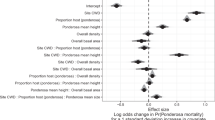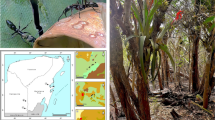Abstract
The southern pine beetle, Dendroctonus frontalis Zimmerman (SPB) is attacked by several species of hymenopterous parasites1,2 the most common of which also parasitise other bark beetles3–5 including the engraver beetles Ips grandicollis (Eichhoif), I. avulsus (Eichhoff), I. calligraphus (Germar), I. pini (Say); and the eastern juniper bark beetle, Phloeosinus dentatus (Say). The increasing importance of pest management has focused attention on the role of their natural enemies. However, the dynamics of bark beetle parasite populations is not generally known beyond estimates of mortality caused by parasites. The hymenopteran parasite guild of D. frontalis may kill up to 30% of a given brood2. Since D. frontalis is cyclic in most areas with epidemics followed by very low population densities1, other beetle hosts probably act as reservoirs for certain species of these parasites3. Conversely, during D. frontalis epidemics, other beetles, such as I. grandicollis and P. dentatus may compete as alternate hosts. Information on preferences for D. frontalis and other associated bark beetles is necessary to understand the interactions of this host–parasite complex. We report here the results of a study designed to determine if several known D. frontalis parasites display any host preferences among D. frontalis, I. grandicollis or P. dentatus.
This is a preview of subscription content, access via your institution
Access options
Subscribe to this journal
Receive 51 print issues and online access
$199.00 per year
only $3.90 per issue
Buy this article
- Purchase on Springer Link
- Instant access to full article PDF
Prices may be subject to local taxes which are calculated during checkout
Similar content being viewed by others
References
Thatcher, R. C. US Forest Sen, South. Forest Exp. Stn. Occasional Paper 180, (1960).
Moore, G. E. Environ. Entomol. 1, 58–65 (1972).
Berisford, C. W. Environ. Entomol. 3, 695–6 (1974).
Berisford, C. W. Can. Entomol. 106, 869–72 (1974).
Berisford, C. W., Kulman, H. M. & Pienkowski, R. L. Can. Entomol. 102, 484–90 (1970).
Camors, F. B. & Payne, T. L. Ann. entomol. Soc. Am. 65, 31–33 (1972).
Matthews, R. W. Contrib. Am. entomol. Inst. 40, 1–86 (1970).
Berisford, C. W. & Franklin, R. T. J. Ga. entomol. Soc. 4, 93–96 (1969).
Peck, O. Can. entomol. Suppl. 30, (1963).
Muesebeck, C. F. et al. USDA Agr. Monogr. 2, (1951).
Berisford, C. W. & Franklin, R. T. J. Ga. entomol. Soc. 7, 110–15 (1972).
Hopkins, A. D. USDA Program of Work, 353, (1917).
Craighead, F. C. J. agric. Res. 22, 189–220 (1921).
Thorpe, W. H. & Jones, F. G. W. Proc. R. Soc. B124, 56–81 (1937).
Richmond, H. A. For. Chron. 9, 60–61 (1933).
Wood, D. L. Univ. Calif. Pub. Entomol. 27, 241–282 (1963).
Thorpe, W. H. Proc. R. Soc. B126, 370–397 (1938).
Cornell, H. & Pimentel, D. Ecology 59(2), 297–308 (1978).
Author information
Authors and Affiliations
Rights and permissions
About this article
Cite this article
Kudon, L., Berisford, C. Influence of brood hosts on host preferences of bark beetle parasites. Nature 283, 288–290 (1980). https://doi.org/10.1038/283288a0
Received:
Accepted:
Issue Date:
DOI: https://doi.org/10.1038/283288a0
This article is cited by
-
10.1007/BF00190848
CrossRef Listing of Deleted DOIs (2011)
-
Pre-pupation behaviour of the aphid parasitoid Aphidius ervi (Haliday) and its consequences for pre-imaginal learning
Naturwissenschaften (2007)
-
Observations on the reproductive biology of two parasites ofHylesinus varius andPhloeotribus scarabaeoides (Col: Scolytidae): Cheiropachus quadrum (Hym: Pteromalidae) andDendrosoter protuberans (Hym: Braconidae)
Entomophaga (1994)
-
Electroantennogram responses of the southern pine beetle parasitoidDinotiscus dendroctoni (Ashmead) (Hymenoptera: Pteromalidae) to potential semiochemicals
Journal of Chemical Ecology (1991)
-
Beneficial arthropod behavior mediated by airborne semiochemicals
Journal of Chemical Ecology (1988)
Comments
By submitting a comment you agree to abide by our Terms and Community Guidelines. If you find something abusive or that does not comply with our terms or guidelines please flag it as inappropriate.



